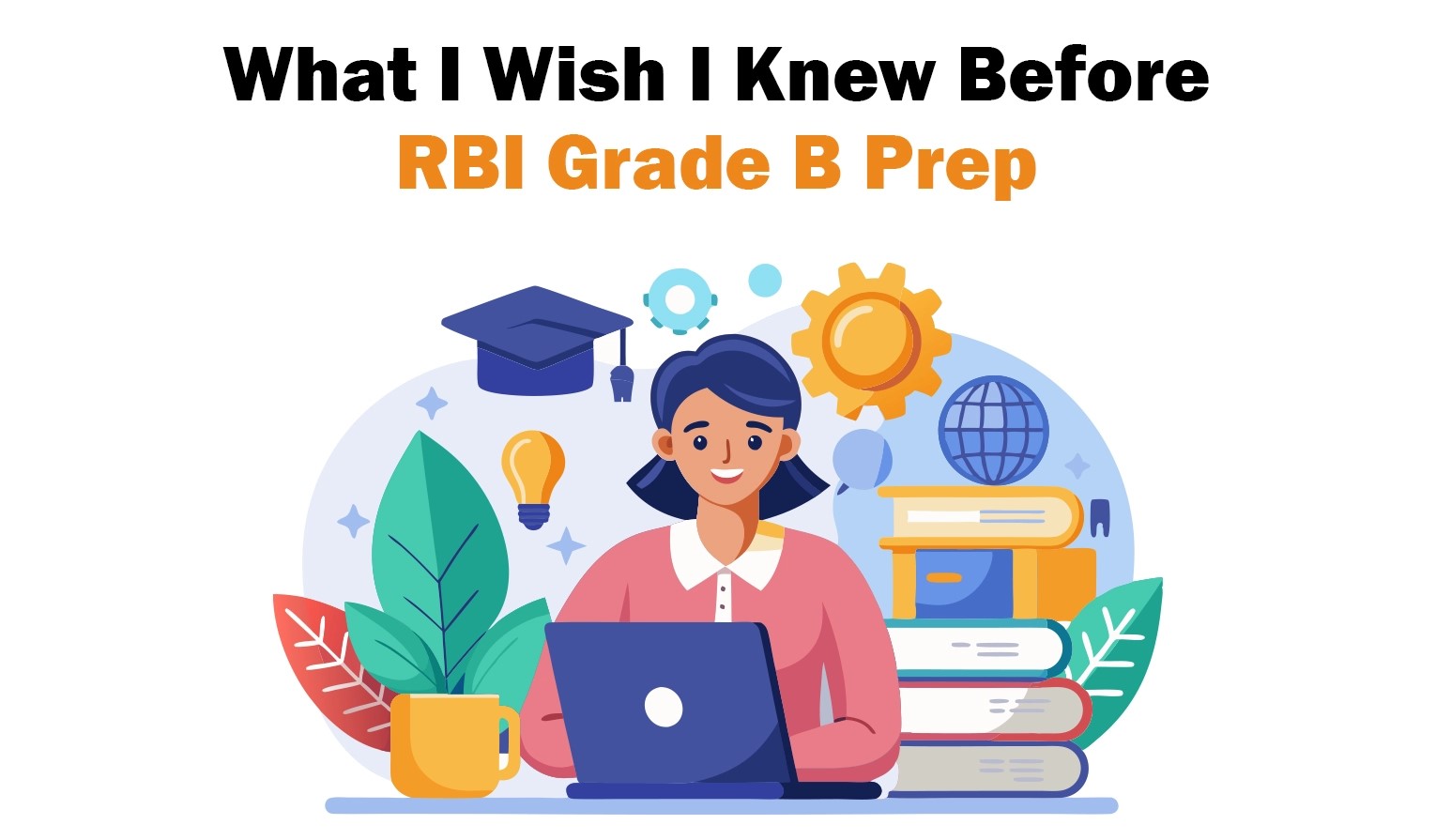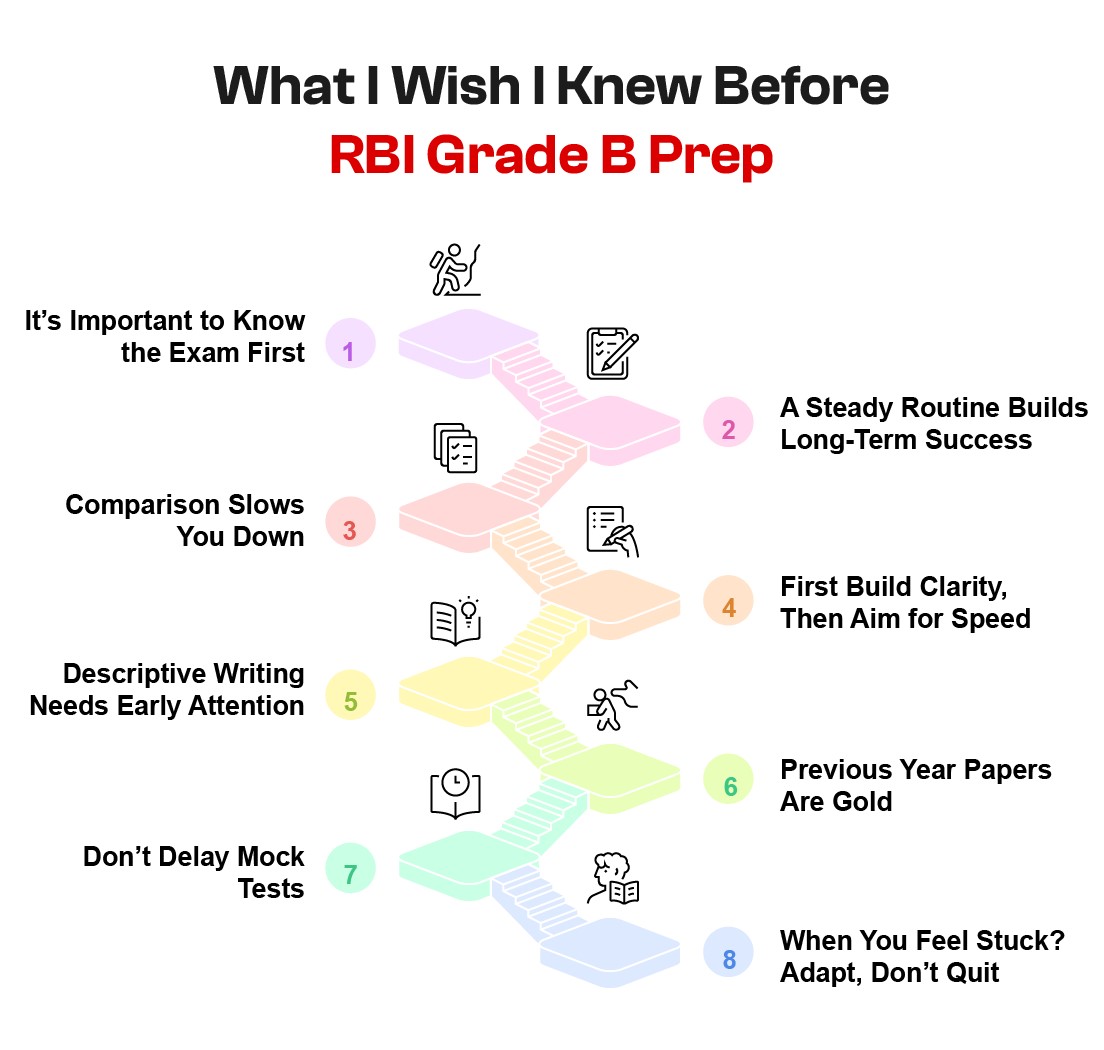When students begin their preparation for the RBI Grade B exam they usually begin on a very high note and a lot of excitement and rightly so. It’s an exam that gets you a managerial position at one of the most prestigious organizations in the country. What begins with excitement, also brings with it a lot of uncertainty. Where do I begin? What should I study first? Do I have enough time? These are just some of the questions that students struggle to answer everyday, especially in the early stages of their preparation. But the sad part is that many realize the right answers only after losing a few precious months. When they look back they often say to themselves, “I wish someone had told me this earlier.” That’s exactly what I am here to help you with through this article, so that you avoid having that regret ever in this journey.
Over the years, after guiding many students, you start noticing the same things again and again. You see bright, hardworking aspirants missing out and that’s not because they didn’t put in the effort, but because they didn’t know what truly mattered in this preparation. Some got too busy just collecting resources. Some ignored descriptive writing until it was too late. Some thought Phase 1 was easy, and it cost them. These aren’t rare stories. They’re common, but honestly, totally avoidable. If new students could just pause, take a step back, and understand the exam before jumping into books, so much confusion and stress could be avoided.
One of the most important things to understand before anything else is the RBI Grade B syllabus. Not just to tick off topics, but to get a clear sense of the journey ahead. It’s not just about what to study, but it’s about how deeply, how smartly, and in what order. When students know this early, they plan better, they study better, and most importantly, they feel more confident. So before you start, read this post like advice from someone who has seen too many students say “I wish I had known this earlier.” Let that not be you.
1. Understand the Nature of the Exam Before You Begin
The first mistake most students make is treating this like any other government exam. It is not. RBI Grade B requires speed, depth, and awareness. You can’t crack it by just finishing books. You need understanding, analysis, and smart application. Most importantly, every phase needs to be taken seriously. Phase 1 isn’t just a screening test, it can be tricky. Phase 2 isn’t just about writing, it’s about expressing your thoughts with clarity. The interview isn’t just about knowledge, rather it’s about maturity and presence of mind.
Understanding this early, changes everything. So before picking any book or course, take a day or two to understand what this exam truly demands.
2. Start with a Balanced Daily Routine
One of the most overlooked aspects of preparation is daily routine. Students either overwork themselves or stay stuck in confusion. A good day of preparation is not about how many hours you studied. It is about how well you used your time and how fresh your mind felt while doing it.
Make space for reading, writing, revision, and rest. Take breaks. Eat well. Sleep on time. And most importantly, stay away from constant comparison. Everyone’s pace is different. Remember, this is a long journey, and you need to last the full race, not burn out midway.
3. Avoid Comparing Your Progress
Every aspirant has a different background, strengths, and challenges. It’s easy to look at peers or toppers and feel you’re behind. But remember, their journey is not yours. Comparing only steals your peace and focus. What matters is that you keep moving forward, even if it’s small steps each day. Your progress may seem slow at times, but it’s still progress. Trust your process and avoid the trap of measuring your success against someone else’s timeline.
4. Build Your Base, Then Worry About Speed
For both RBI and other competitive exams, the trap of “mock tests” can sometimes do more harm than good in the early phase. Yes, practice matters. But practice without a foundation creates false confidence. First build your concepts, understand the syllabus well, and only then push for speed. Slow progress is still progress. Do not rush to attempt 50 mocks when you still hesitate with basic questions.
5. Do Not Ignore Descriptive Writing from Day One
This is one thing even serious students often realize too late. They keep focusing on objective preparation for ESI and FM and think they will “start writing later.” The problem is, writing is not a topic. It is a skill, for which you need both time and effort. You cannot suddenly become good at writing structured answers under time pressure just because you covered the syllabus.
Students who begin writing early, even if it is just one answer a week have a huge advantage. They learn how to think in layers, how to present arguments, how to support their views with facts. This makes their descriptive answers stand out.
6. Learn Deeply from Previous Year Papers
Many students treat previous year papers like just another set of practice questions. But RBI Grade B previous papers are precious resources for your preparation. They show you the examiners’ thought process, which topics are emphasized, and the level of difficulty to expect. Don’t just practice them once. Analyze your mistakes, understand why a question was asked, and identify patterns. This will sharpen your preparation and build exam confidence in ways random studying can’t.
7. Start Mock Tests Early
Yes, I agree that you cannot start attempting mock tests from day one. But they are not just for the final phase before the exam. You will learn a lot from them if you make them a part of your preparation early on. Along with being perfect for practice, these tests teach you a lot about time management, help you get used to the exam environment, and understand question patterns. Even if you don’t perform well initially, every mock test teaches you something important. Treat each mock as feedback, not a judgement. The goal is steady improvement, not instant perfection.
8. Adapt When You Feel Stuck
I have said this to my students multiple times that feeling stuck or frustrated during preparation is normal. When progress will be slow or not as per your plans, or you find topics difficult, which will definitely happen, make sure that you don’t panic or give up. Maybe it’s time to change your study material, try different learning methods, or take help from a mentor, a teacher or a friend. This journey will teach you that flexibility is a strength, and not a weakness.
The RBI Grade B exam is not just about clearing three phases, rather it is about growing into a mature, well-read, and well-prepared individual. And while the competition is tough, the path becomes clearer when you learn from those who walked it before you. Do not wait to learn through mistakes that others have already made. Use their lessons as your starting point.

